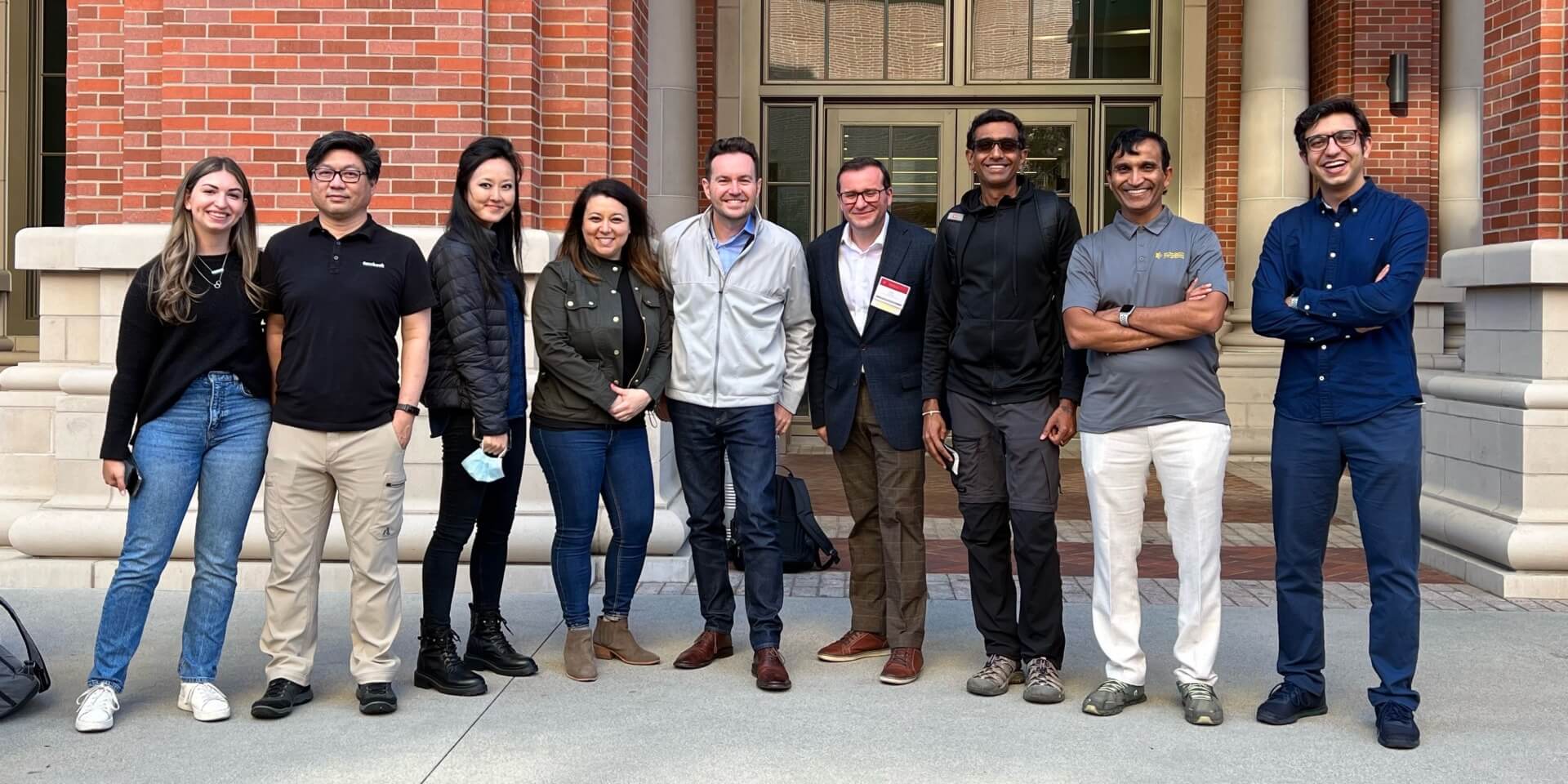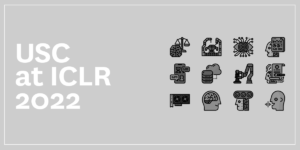
Center director Murali Annavaram (second from right) and associate director Meisam Razaviyayn (far right) hosted the event (PHOTO CREDIT: USC Viterbi)
On May 23rd, the USC-Meta Center for Research and Education in AI and Machine Learning hosted its first major event. The center was established in Fall of 2021 with the goal of addressing the technological challenges related to making AI and machine learning sustainable, efficient, and scalable. Nearly 100 attendees including, Meta representatives and USC Viterbi students and faculty who work in the AI and Machine Learning spaces, attended the workshop and poster session.
“Our center identified four pillars of support we can provide to the next generation of AI and Machine Learning researchers and industry leaders,” said Murali Annavaram, Professor of Electrical and Computer Engineering and the center’s inaugural director. “Those pillars, research, teaching, fellowships, and outreach, were all addressed at this inaugural in-person event.”
Research

Seventeen USC Viterbi students shared their research in AI and Machine Learning with visitors from Meta (PHOTO CREDIT: USC Viterbi)
The research focus of the event centered on a series of ML presentations on the efficiency, security, and privacy of machine learning algorithms, followed by an in-depth poster session. A total of 25 PhD students shared their research with the visiting Meta team. These events allowed Meta visitors to get a better understanding of the breadth and depth of work already being done at USC Viterbi in AI and Machine Learning. The face-to-face nature of the session allowed industry representatives to ask questions and collaborate with researchers on future ideas.
“USC Viterbi already has a strong presence in AI and Machine Learning research, which is why we were selected to establish this center,” said Meisam Razaviyayn, Assistant Professor of Industrial and Systems Engineering, and the center’s Associate Director. “The research sessions are a perfect opportunity to showcase our strength to our Meta partners and to establish future collaborations.”
“The event was a great opportunity to connect with folks in industry and exchange ideas. It was nice to present my work to people who might be able to apply our algorithms in practice to help protect people’s privacy, at Meta and beyond,” said PhD student and presenter Andrew Lowy.
Teaching
As the field of AI and Machine Learning grows and technology continues to improve, teaching and courses that address this area can and must evolve alongside it. At this workshop, the USC-Meta center announced two important curriculum enhancements that will better prepare students for research and work in these fields. The electrical and computer engineering department is adding systems and implementation-oriented ML course offerings in the near future (pending university approvals) and the industrial and systems engineering department is significantly enhancing the curriculum of the Masters in Analytics program.
Fellowships
Center leaders announced the inaugural cohort of six new MS fellowship recipients, a first of its kind at USC. In fact, these fellowships represent the first comprehensive, all-tuition paid fellowships for MS students with diverse and rigorous academic backgrounds. The awards also will foster diversity and inclusion among MS students working in relevant areas of research.
“The generous support of the USC Meta Center has provided an invaluable opportunity for Masters students to pursue their passion for AI,” said Camillia Lee, USC Viterbi Associate Dean of Graduate Admission. “The USC Meta fellowship will play a major role in achieving the Viterbi School’s goal of continuing to attract some of the most talented and diverse students in the country, and prepare them for future careers in AI and machine learning.”
Outreach
During the center’s board meeting, USC Viterbi and Meta discussed the importance of improving mentorship and support to students who are part of the center or supported by center fellowships. The team agreed that outreach in this area should be expanded beyond PhD students to also include MS, undergraduate students, and K-12 students.
In collaboration with USC Viterbi’s SURE (summer undergraduate research experience) program, the center will support multiple undergraduate student researchers visiting USC this summer. That program, which sees students from all over the country come to campus to be exposed to engineering research, will now enjoy more support from the USC-Meta center. Five high school students will also be supported and mentored by the center this summer as part of USC Viterbi’s SHINE program. Leaders of both those programs were quick to praise the center’s support.
“The additional financial support for SURE from the USC-Meta center will allow us to bring even more students into this program and let us focus even more on the important and growing fields of AI and Machine learning,” said Andy Jones-Liang, associate director of academic services.
Despite the already great progress made in the nascent 5 months since the inception of the center, the center directors have a vision to bring academic and industry researchers in ML to collaborate on compelling societal challenges and to provide mentoring support for the next generation of ML engineers.
Published on June 16th, 2022
Last updated on June 16th, 2022









